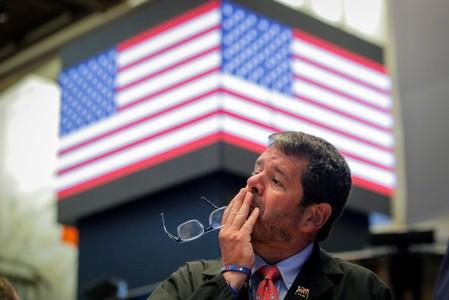Wall Street sold off sharply on Wednesday as recession fears gripped the market after the U.S. Treasury yield curve temporarily inverted for the first time in 12 years.
All three major U.S. indexes closed down about 3%, with the blue-chip Dow posting its biggest one-day point drop since October after 2-year Treasury yields surpassed those of 10-year bonds, which is considered a classic recession signal.
Dire economic data from China and Germany suggested a faltering global economy, stricken by the increasingly belligerent U.S.-China trade war, Brexit woes and geopolitical tensions.
Germany reported a contraction in second-quarter gross domestic product, and China’s industrial growth in July hit a 17-year low.
“It was all negative and not much positive today,” said Chuck Carlson, chief executive officer at Horizon Investment Services in Hammond, Indiana. “We’re outside of the earnings season and markets are being batted around by news.”
“It’s a reactionary market right now and probably will continue to be,” Carlson added. “My guess is we’re probably in for this until after Labor Day.”
Wednesday was the first time that yields for 2-year and 10-year Treasuries had inverted since June 2007, months before the onset of the great recession, which crippled markets for years.
The U.S. yield curve has inverted before every recession in the past 50 years.
“It could be different this time,” Carlson said. “When you’ve got $15 trillion in global government debt at negative yields, that’s a new animal.
“Even if it is accurate in foreshadowing a recession, that doesn’t mean it’s coming tomorrow,” he added.
The CBOE volatility index <.VIX>, a gauge of investor anxiety, jumped 4.58 points to 22.10.
The Dow Jones Industrial Average <.DJI> fell 800.49 points, or 3.05%, to 25,479.42, the S&P 500 <.SPX> lost 85.72 points, or 2.93%, to 2,840.6, and the Nasdaq Composite <.IXIC> dropped 242.42 points, or 3.02%, to 7,773.94.
Over 300 of the S&P 500’s components are down 10% or more from their 52-week highs, according to Refinitiv data. More than 180 of those stocks have fallen more than 20% from their 52-week highs, putting them in bear market territory.
All of the 11 major sectors in the S&P 500 closed in negative territory, with energy <.SPNY>, financials <.SPSY>, materials <.SPLRCM>, consumer discretionary <.SPLRCD> and communications services all falling 3% or more.
Interest rate-sensitive banks <.SPXBK> tumbled 4.3%.
Macy’s Inc’s shares plunged 13.2% after the department store operator missed quarterly profit estimates and cut its full-year earnings estimates.
Rival department store operators Nordstrom Inc and Kohls Corp slid 10.6% and 11.0%, respectively.
A U.S. House of Representatives oversight panel called on Mylan NV and Teva Pharmaceutical Industries Ltd to turn over documents as part of a review into generic drug price increases.
Mylan fell 8.5% while U.S.-listed Teva shares dipped 10.5%.
Facebook Inc slid 4.6% on news that the European Union’s lead regulator is investigating how the social media company handled data during the manual transcription of users’ audio recordings.
Declining issues outnumbered advancing ones on the NYSE by a 4.44-to-1 ratio; on Nasdaq, a 5.33-to-1 ratio favoured decliners.
The S&P 500 posted eight new 52-week highs and 51 new lows; the Nasdaq Composite recorded 23 new highs and 282 new lows.
Volume on U.S. exchanges was 8.68 billion shares, compared with the 7.47 billion average over the last 20 trading days.
(Reporting by Stephen Culp; additional reporting by Noel Randewich; Editing by Leslie Adler)














